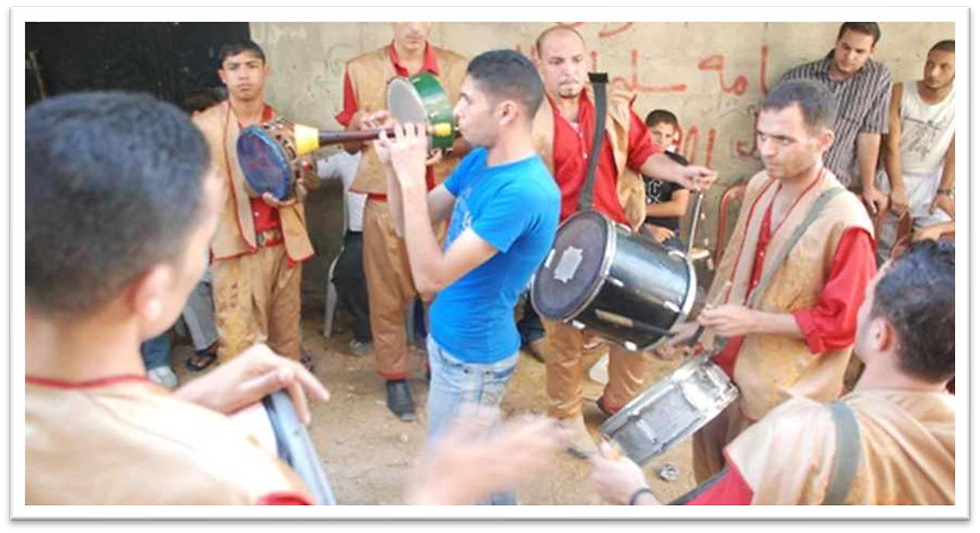The Dom of Jerusalem: A minority within a minority
- Aug 6, 2025
- 3 min read
Updated: Dec 19, 2025
Within my own city, I’ve come to know some of the Eastern European Roma community. Their language and appearance reflect their Indian heritage, however, one man insists his ancestors lived in Jerusalem for centuries before finally travelling to Europe. This interested me and led me to learn about the Domari or "Gypsies of the Middle East" as they sometimes call themselves. While visiting Jerusalem earlier this year, I spent a day with Amoun Sleem, the founder of
History:
The Domari people, also known as the Dom, are an Indo-Aryan ethnic group originally from India. they have a rich cultural heritage and a unique language called Domari. Primarily found in the Middle East and North Africa, they began migrating in several waves between the 3rd and 10th centuries. Unlike the Romani people, who migrated to Europe, the Domari settled in areas such as Palestine, Jordan, Syria, Iraq, Lebanon, and Egypt.
Traditionally, they worked as metalworkers, entertainers, musicians, and craftsmen—occupations that required mobility and skill. However, modern pressures, urbanization, and discrimination have led many Domari to settle in impoverished neighbourhoods, where they often face exclusion from education, employment, and healthcare.
The Domari people in Jerusalem are part of a larger Dom community spread across the Middle East and North Africa. They are believed to have migrated from India between the 3rd and 10th centuries, settling in various regions, including Palestine, Syria, Jordan, Lebanon, and Egypt. Related to the Roma people of Europe, they share ancestors from the same untouchable castes of Northern India.
For centuries, they have lived in the Bab Hutta district, tight up against the wall of the Old City near the Lion's Gate. Many Dom men were tinkers, repairing small items and doing day labour. A strong distrust of authority meant few sent their children to school.

Over time, they adopted Arabic as their primary language but were never fully accepted into Palestinian society, remaining distinct due to their cultural traditions. Nonetheless the conflict in the Holy Land has impacted them. For example, during the Six Day War the entire community took refuge in Saint Anne's Church by the Pool of Bethesda, with a large section of the community being displaced to refugee camps.

Struggles faced by Domari community:
The Domari Gypsy community in Jerusalem faces severe poverty, discrimination, and low literacy levels.
In 2014, nearly 80% of Domari men lacked stable employment, forcing 72% of families to rely on unemployment benefits and other support. Many Domari couples have large families (average seven children). The community also experiences discrimination and social exclusion.

Domari people are often subjected to prejudice and xenophobia, and their children frequently face isolation from local peers. Schools do not make special efforts to prevent Domari children from
dropping out, contributing to low education levels. Many Domari individuals have never attended school, leading to high illiteracy rates among adults. Now, only 20% of adult Domari in Jerusalem speak Domari as a primary home language, with younger generations mostly speaking Arabic.
The Domari Society of Gypsies in Jerusalem
Founded in 1999 by Amoun Sleem, Domari Society of Gypsies in Jerusalem seeks to preserve Domari culture, language, and identity while addressing critical social issues with the following programs at its community centre in Shuafat. These efforts include support for children by tutoring and advocacy to reduce dropout rates among Dom children; training for woman through programs like hairdressing and business to help Dom women gain financial independence; efforts to preserve Domari culture and language; providing essentials to Domari families in need or during times of crisis; and offering Domari cooking and craft workshops, generating jobs and income for
Educational Support for Children: The Society provides afterschool tutoring, school materials, and advocacy to improve academic success and reduce dropout rates among Dom children.
Vocational Training for Women: Programs in hairdressing, catering, and business skills help Dom women gain financial independence and confidence.
Cultural Preservation: The Society promotes Domari heritage through cultural events, traditional music, a cookbook, historical resources, and language preservation efforts.
Humanitarian Aid: Essential support such as food, medical supplies, and school materials is provided to families in need, especially during crises.
Tourism and Cultural Exchange: Visitors can experience Domari culture through meals and craft workshops, generating income and training opportunities for Dom women

Domari in Jabaliya refugee camp, Gaza. Population - 4K prior to 2023. Currently - unknown If you wish to support the work of Amoun Sleem and the Domari Centre, then please click the icon below:






Comments